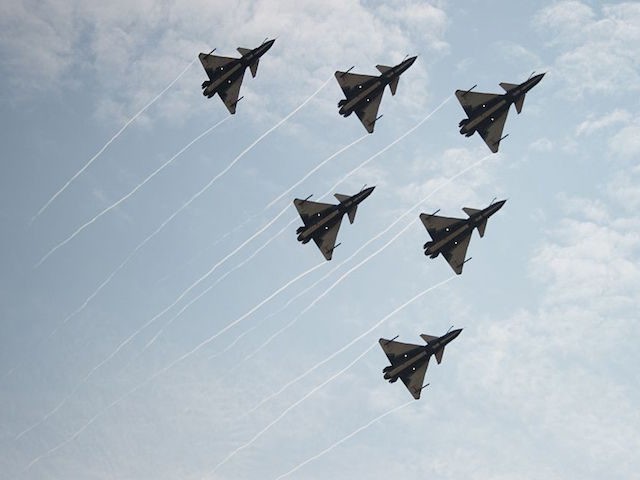The Chinese military has once against performed an “unsafe” intercept of an American aircraft in the Pacific region, with a Chinese jet reportedly flying towards the reconnaissance aircraft at an unreasonably high speed and risking crashing into it.
The belligerent move in the East China Sea occurred during Secretary of State John Kerry’s visit to Beijing this week to discuss a variety of diplomatic matters, primarily the economic ties between the two country.
According to CNN, American military officials said a Chinese J-10 fighter jet approached the American aircraft at a “high rate of speed as it closed in” at the same altitude as the American aircraft, clearly creating the possibility of the two planes crashing into each other. “This seems to be a case of improper airmanship, as no other provocative or unsafe maneuvers occurred,” United States Pacific Command said in a statement about the incident, blaming incompetence over ill intent. Pacific Command confirmed that American officials are addressing the issue “in appropriate diplomatic and military channels.”
The Wall Street Journal describes the Chinese defense ministry as appearing somewhat irritated at being asked about the incident Wednesday, claiming the United States was “again deliberately hyping” Chinese aggression in the region. “Chinese military pilots always operate according to laws and regulations, and are professional and responsible,” the ministry told the Wall Street Journal. In his regular press briefing, foreign ministry spokesman Hong Lei accused the United States of working to “severely undermine China’s maritime security” with these flights, rather than addressing the behavior of the Chinese aircraft.
This latest transgression occurs a month after Chinese fighter jets intercepted another American aircraft in the South China Sea, in a manner U.S. deffense officials protested was “unsafe,” as it required the American aircraft to descend rapidly to avoid crashing into the Chinese jets.
“This is potentially part of a disturbing trend line as the Chinese try to push their military envelope into greater parts of the sea surrounding their mainland,” Sen. Chris Murphy (D-CT) of Foreign Relations Committee said at the time.
The timing also coincides with Secretary Kerry’s presence in China, along with Treasury Secretary Jack Lew.
Chinese state media outlets are touting the meetings as a success, quoting Chinese Premier Li Kequiang as saying that the two nations “should jointly strive to deepen mutual trust and expand cooperation,” particularly economically. Both Li and the state outlet Xinhua used the word “natural” to describe tensions between the U.S. and China, downplaying them compared to what China has to gain in negotiating trade with America.
While China’s major territorial disputes are currently occurring in the South China Sea, where the Philippines has taken Beijing to the Permanent Court of Arbitration at The Hague over its colonization of Philippine reefs, China has yet to resolve a maritime dispute with Japan in the East China Sea. China claims sovereignty over Japan’s Senkaku Islands, an uninhabited set of islands rich in natural resources. In February, China sent an advance missile frigate into the East China Sea, ostensibly to intimidate the Japanese self-defense units out of asserting sovereignty over part of the sea. Japanese legislators responded by demanding that Prime Minister Shinzo Abe bring a case to an international tribunal regarding the islands, as the Philippines has done.
Tensions in the East China Sea have remained at a lower level than those in the South China Sea since China established an Air Defense Identification Zone (ADIZ) over the Senkaku Islands, a move that requires any foreign aircraft to identify itself to Beijing and request permission to transit through international skies. The move has been widely ignored since 2013, as President Obama asserted shortly after the announcement that any attack on a Japanese plane would bind America by treaty to attack China.
Defense Secretary Ashton Carter, who has vocally opposed China’s colonizing of the South China Sea, is expected to visit Beijing later in 2016, according to a new report in Xinhua.

COMMENTS
Please let us know if you're having issues with commenting.